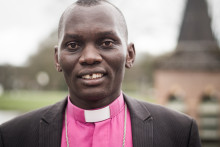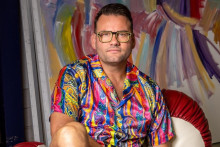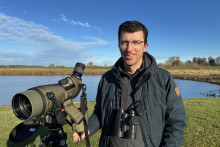Bishop Orina travelled all the way from Kenya to preach the Sunday service of ICF. Why was this visit important for you?
Nyamu: ‘I met the bishop back in 2015 in Kenya. I was privileged to attend his services. He is very passionate about the gospel and he said he would really appreciate the chance to preach abroad. I’ve been a member of ICF since I arrived to the Netherlands, but I didn’t think it would be possible for him to come to us because we couldn’t cover his travel costs. The bishop was very eager, though. He organized everything by himself and arrived last week. He came to us with a good message and everyone was really inspired by him.’
Bishop Orina: ‘It is my passion to preach to young people. I’m the youngest bishop in the Anglican Church in Africa and I see the importance of including the youth. Young people can inject freshness into society, politics, religion – everything. I want to mentor young people and help them in the right direction, help them become responsible citizens. That is my calling. And I’m here to learn and to gain new experiences, to make friends and seek partnerships. To see how we could learn from the way things are done in the Netherlands.’
Bishop Orina during service of the ICF in Enschede on the 17th of March. Photo by ICF
How old were you when you were ordained?
Bishop Orina: ‘I was 34, now I’m 37. It is strange in the Anglican Church to be ordained this young. It is not easy. But the larger province of Kisii unanimously decided to appoint me. Possibly because I was very busy and creative as a priest. I’ve done things differently. I preached in the market place, I talked to young people, invited them home for dinner.’
Nyamu: ‘In Kisii I saw things that I didn’t experience in my previous church. The bishop applies something called “business for mission”, a program to empower the poor, especially women. For example, he set up stalls in the church compound so that people could do business there.’
Bishop Orina: ‘Kisii is a very large area with about 4.6 million people. I’m trying to build a new type of community there. I’ve set up specific objectives. I’m making sure that the gospel is understood, therefore that it is translated into the local language. I aim to educate young people to become leaders. I want the people to use local resources for sustainability and teach people about environmental issues. I’m also focused on social responsibility, addressing issues that hurt the community. For example, there is still the issue of female genital mutilation in the area. That is something that is vile and needs to be addressed.’
You seem very devoted to your profession. Where does that come from?
Bishop Orina: ‘I’m very devoted. It might stem from my complicated background. I was born in a polygamous family. My parents were drinking and didn’t encourage us to go to school or churches. I took jobs to pay for my school fees and couldn’t afford lunch. For years I went without lunch. At high school I accepted Jesus Christ as my savior and that changed my life. I began to think in a different way and I knew I had to shape my destiny.’

UT student Pauline Nyamu with Bishop John Orina. Photo by Joël Gugler.
You mentioned that you came to Enschede to gain new experiences. What has the experience been like so far?
Bishop Orina: ‘The most exciting thing about this visit so far was to see people from different nations coming together. This is my first time in Europe. I’ve noticed that there are many churches that had been closed down. The situation in Kenya is completely different. Churches there are growing, gaining new members. I’ve been thinking about this difference. I might be wrong, but I imagine that people here don’t go to church so much because the Netherlands is such a highly organized and developed country.’
Nyamu: ‘Yes, that might be. In my personal opinion, people in Kenya and developing countries go to church to seek consolation, to feel encouraged. But if you are self-sufficient, you think you don’t need God. When you have enough, you tend to move away from God and only go back to him when problems strike.’
Is there anything specific that you will be taking home with you?
Bishop Orina: ‘What I noticed is how well people here take care of their environment. And it’s the first time I’ve experience cashless society. Everyone pays with cards. Things are quite different in Kenya, but I hope that some of these developments come there.’








